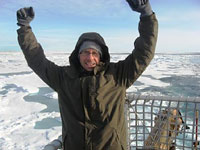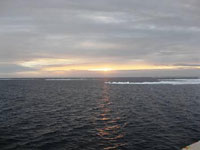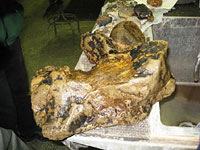

 | |||||||||||||||
|
|
Journals 2008/2009Steve Howard
September 2, 2008
As we begin the long transit back toward Barrow, I find my mind shift more and more to going home. I think others are feeling it as well; conversations over meals are less about the science taking place or the data being collected, and more about what lies ahead for each of us (school, family, work) when we get back to "civilization." Today was the first day of school, and in my 15 years of teaching I've never missed the first day. It's one of those unique days where you get to meet "your" kids and welcome them back and set the stage for the relationships that make teaching one of the most unique and rewarding of careers. I shot a couple "Hello from the Arctic" videos that I am hoping to get out my students at Meadowdale Middle school, where I teach, but pushing even a one minute video file from the Arctic through our limited bandwidth is like sucking a watermelon through a soda straw. I've got someone on board who can hopefully help me with this, so we'll see if he's able to get it out there. If not, then to any of my students reading this... "Welcome back to another school year, and I'm looking forward to sharing stories and images of this experience with you soon!"
As we push southward, there is another reminder of the changes taking place: sunset. At this latitude as we approach the autumn equinox, we lose about ten minutes of daylight every 24 hours, which quickly adds up. It is becoming noticeably darker in the evening, and this will continue to become more and more obvious between now and when we arrive back in Barrow in three days. This is welcome in some respects, as my night-starved brain struggles to cope with the perpetual daylight we've been having. I wonder what it must be like to live in the Arctic region and anticipate the months and months of darkness and extreme cold that is quickly approaching. How do they handle it (or maybe more interestingly, how would I handle it?) What would it feel like? I've traveled and lived in a number of different countries, from Europe to Southeast Asia, but I've never been in a place that is as strikingly "foreign" to me as my brief time in the Arctic. It has certainly been an unforgettable experience.
Not that we're done with the science. We continue to map as we move along from dredge site to dredge site, and are pulling up rocks along the way. The most recent dredge was very successful, as there was no mud in the material recovered and some pretty good sized rocks. The next (and probably last) dredge site might be sometime between midnight and 7am, and since I've offered to help out I had better get some sleep. We also need to redeploy the HARP buoys in the next few days that were recovered at the start of the expedition.
|
||||||||||||||



